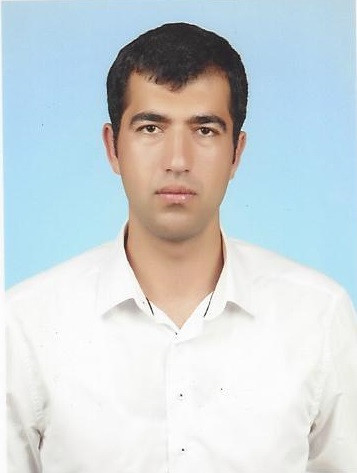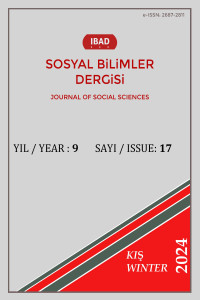Original Articles
Review Articles
Book Review
Issue Reviewers

 0000-0002-8492-5099
0000-0002-8492-5099
 0000-0002-5609-6975
0000-0002-5609-6975





 0000-0002-0339-336X
0000-0002-0339-336X

 0000-0002-2539-8452
0000-0002-2539-8452








 0000-0001-6056-2564
0000-0001-6056-2564

 0000-0001-6025-9696
0000-0001-6025-9696









 0000-0002-3751-131X
0000-0002-3751-131X





 0000-0002-6402-1148
0000-0002-6402-1148

 0000-0001-8593-4125
0000-0001-8593-4125
 0000-0001-5975-1552
0000-0001-5975-1552




Aim & Scope
Scope
IBAD includes studies that address current and historical issues regarding Turkey and the Turks in the field of social sciences from a scientific point of view, and suggest solutions in this regard. The journal also includes the studies conducted by Turkish researchers in the field of social sciences. In addition, it is also open to submissions from and about Cyprus and European countries, since they have close relations with Turkey.
Author Guidelines
GENERALLY
1. IBAD is published in Summer/August and Fall/December after 2021.
2. The articles submitted to the IBAD are published following review by the editorial board and at least two advisors and once the necessary amendments are made (MS Word program is required). The articles should not have be previously published or submitted to another journal in order to be published.
3. Articles which are not accepted for publishing are not returned, the review report of the article is sent to the author(s).
4. The publication rights of the articles accepted for publishing are transferred to the journal with the ‘Copyright Transfer Form'.
5. In papers which have been previously presented in a conference or symposium, this should be stated in the article.
6. Local ethical council approval should be obtained for research.
7. The author(s) of the accepted article are considered to have accepted the Turkish revision to be made by the editor.
8. IBAD does not charge article processing charges or submission charges.
9.The works can be in Turkish or English.
Writing Rules
The articles that are submitted to be published in IBAD should be in line with APA 6th or 7th Edition.
Book
Kahya, H. (2017). Karamanlıca bir çocuk dergisi: Angeliaforos Çocuklar İçün (1872). Ankara: Grafiker Publishing.
Arıcı, A. F. and Ungan, S. (2015). Yazılı anlatım el kitabı. Ankara: Pegem Akademi Publishing.
Journal Article
Kahya, H. (2018). Aday Türk dili ve edebiyatı öğretmenlerinin “edebiyat öğretmeni” kavramına ilişkin algılarının metafor yoluyla analizi. International Journal of Scientific Research, 3(1), 104-117.
Çeliköz, N. ve Çeliköz, M. (2018). Öğretmen adaylarının medya ve televizyon okuryazarlık düzeyleri. International Journal of Scientific Research, 3(1), 262-274
Thesis or dissertation
Çoban, İ. (2010). Türkçe öğretmeni adaylarının Türkçedeki alıntı sözcükleri kullanma düzeylerinin incelenmesi. Unpublished Phd dissertation/thesis, Atatürk University, Erzurum.
Electronical references
Altun, A. (2003). E-okuryazarlık. Journal of Milli Eğitim, 158. Retriewe from http://www.meb.gov.tr/index800.htm on December 10, 2003.
Manuscript Preparation
The manuscript should be written in clear, concise and grammatically correct Turkish or English.
The manuscript should be in MS Word program, with the Palatino Linotype font, 6nk after and before, 11 font size, single line spacing. The margins are set as follows: top = 55 mm, bottom = 40 mm, right = 40 mm, left = 40 mm. Pages should not be numbered.
The manuscript should be presented in the following order.
Title and Running Head
The running head or short title is the shortened version of your manuscript. it also acts as the manuscript title on the journal homepage providing information at a glance for people who are reading the journal. Paper Turkish title must be Left size, bold, regular font size 12 and the first letter of each word capitalized. Paper English title, however, must be Left size, italic, regular font size 11 and the first letter of each word capitalized.
The author's name and address
This should contain the title of the contribution and the names of the authors. The e-mail address(es) and ORCID ID number(s) of the author(s) should be included. The first letter of each author names must be capital and bold, author(s) title, affiliation, and country must be left size, regular font size 9 or 10.
Abstract
All manuscripts must include a brief but informative Abstract in Turkisn and English. It should not exceed 300 words and should describe the scope, hypothesis or rationale for the work and the main findings. Both common and scientific names should be included; the authorities are not given if they appear in the title. References to the literature and mathematical symbols/equations should not be included. Abstracts must be written in 9 pt.
Keywords
Key words (3-8) should be in English and Turkish provided below the Abstract to assist with indexing of the article.
Figures
At initial submission, figures should be at good enough quality and high contrast to be assessed by referees, preferably incorporated with the manuscript text in a single Word doc or PDF, although figures can be supplied separately as JPEGs if authors are unable to include them with the text.
Figures, tables and illustrations should not exceed 10 pages.
References
All publications cited in the text should be presented in a list of “REFERENCES” following the text of the manuscript.
References to be consistent in itself, should be given in the text or at the end of the page.
Submission Preparation Checklist
Before submitting the manuscript, author(s) should check the following list.
1. The submission has not been previously published, nor is it before another journal for consideration.
2. The submission file is in Microsoft Word file format.
3. Manuscript has been made in the light of Journal’s author guidelines.
4. Author(s) did not mention his or her name and affiliation in the main text.
5. Author(s) has read all the terms and conditions of the journal.
6. Author(s) must follow “SUBMISSION TRACKING SYSTEM” to submit their manuscript.
7. Manuscripts Sent via e-mail are not taken into account.
8. Microsoft Word formats must be submitted online to IBAD for initial evaluation. For online submission of manuscripts authors should go to "Submit Article".
Review Process
All manuscripts submitted to IBAD undergo extensive evaluation while its in the peer-review process.
Ethical Principles and Publication Policy
Editorial Policy
IBAD follows the “Code of Conduct and Best Practice Guidelines for Journal Editors” and “Code of Conduct for Journal Publishers” documents of Committee on Publication Ethics (COPE). For the “Core Practices” document of COPE see: https://publicationethics.org
Manuscripts are accepted with the understanding that the authors have not violated any ethical practice followed in preparation and publication of manuscripts. Author/s is/are responsible for all the statements made in their work and should be willing to defend them publicly, if challenged. Authors should prepare their manuscripts submitted to the journal exactly according to the instructions given. Manuscripts which do not follow the format and style of the journal may be returned to the authors for revision or rejected. The journal reserves the right to make any further formal changes and language corrections necessary in a manuscript accepted for publication. Manuscripts and figures are not returned to the authors, not even upon rejection of the paper.
Publication Ethics and Publication Malpractice Statement (Ethical guidelines for publication)
The publication of an article in the peer-reviewed journal IBAD is an essential building block in the development of a coherent and respected network of knowledge. It is a direct reflection of the quality of the work of the authors and the institutions that support them. Peer-reviewed articles support and embody the scientific method. It is therefore important to agree upon standards of expected ethical behaviour for all parties involved in the act of publishing: the author, the journal editor, the peer reviewer, the publisher and the society of society-owned or sponsored journals.
IBAD, as publisher of the journal, takes its duties of guardianship over all stages of publishing extremely seriously and we recognise our ethical and other responsibilities.
We are committed to ensuring that advertising, reprint or other commercial revenue has no impact or influence on editorial decisions. In addition, Editorial Board will assist in communications with other journals and/or publishers where this is useful to editors. Finally, we are working closely with other publishers and industry associations to set standards for best practices on ethical matters, errors and retractions - and are prepared to provide specialized legal review and counsel if necessary.
Duties of authors
(These guidelines are based on existing COPE’s Best Practice Guidelines for Journal Editors.)
Reporting standards
Authors of reports of original research should present an accurate account of the work performed as well as an objective discussion of its significance. Underlying data should be represented accurately in the paper. A paper should contain sufficient detail and references to permit others to replicate the work. Fraudulent or knowingly inaccurate statements constitute unethical behavior and are unacceptable. Review and professional publication articles should also be accurate and objective, and editorial ‘opinion’ works should be clearly identified as such.
Data access and retention
Authors may be asked to provide the raw data in connection with a paper for editorial review, and should be prepared to provide public access to such data (consistent with the ALPSP-STM Statement on Data and Databases), if practicable, and should in any event be prepared to retain such data for a reasonable time after publication.
Originality and plagiarism
The authors should ensure that they have written entirely original works, and if the authors have used the work and/or words of others, that this has been appropriately cited or quoted.
Plagiarism takes many forms, from ‘passing off’ another’s paper as the author’s own paper, to copying or paraphrasing substantial parts of another’s paper (without attribution), to claiming results from research conducted by others. Plagiarism in all its forms constitutes unethical publishing behavior and is unacceptable. iThenticate and/or Turnitin software are used for plagiarism.
Multiple, redundant or concurrent publication
An author should not in general publish manuscripts describing essentially the same research in more than one journal or primary publication. Submitting the same manuscript to more than one journal concurrently constitutes unethical publishing behavior and is unacceptable.
In general, an author should not submit for consideration in another journal a previously published paper. The authors and editors of the journals concerned must agree to the secondary publication, which must reflect the same data and interpretation of the primary document. The primary reference must be cited in the secondary publication. Further detail on acceptable forms of secondary publication can be found at www.icmje.org.
Acknowledgement of sources
Proper acknowledgment of the work of others must always be given. Authors should cite publications that have been influential in determining the nature of the reported work. Information obtained privately, as in conversation, correspondence, or discussion with third parties, must not be used or reported without explicit, written permission from the source. Information obtained in the course of confidential services, such as refereeing manuscripts or grant applications, must not be used without the explicit written permission of the author of the work involved in these services.
Authorship of the paper
Authorship should be limited to those who have made a significant contribution to the conception, design, execution, or interpretation of the reported study. All those who have made significant contributions should be listed as co-authors. Where there are others who have participated in certain substantive aspects of the research project, they should be acknowledged or listed as contributors.
The corresponding author should ensure that all appropriate co-authors and no inappropriate co-authors are included on the paper, and that all co-authors have seen and approved the final version of the paper and have agreed to its submission for publication.
Hazards and human or animal subjects
If the work involves chemicals, procedures or equipment that have any unusual hazards inherent in their use, the author must clearly identify these in the manuscript. If the work involves the use of animal or human subjects, the author should ensure that the manuscript contains a statement that all procedures were performed in compliance with relevant laws and institutional guidelines and that the appropriate institutional committee(s) has approved them. Authors should include a statement in the manuscript that informed consent was obtained for experimentation with human subjects. The privacy rights of human subjects must always be observed.
Disclosure and conflicts of interest
All authors should disclose in their manuscript any financial or other substantive conflict of interest that might be construed to influence the results or interpretation of their manuscript. All sources of financial support for the project should be disclosed.
Examples of potential conflicts of interest which should be disclosed include employment, consultancies, stock ownership, honoraria, paid expert testimony, patent applications/registrations, and grants or other funding. Potential conflicts of interest should be disclosed at the earliest stage possible.
Fundamental errors in published works
When an author discovers a significant error or inaccuracy in his/her own published work, it is the author’s obligation to promptly notify the journal editor or publisher and cooperate with the editor to retract or correct the paper. If the editor or the publisher learns from a third party that a published work contains a significant error, it is the obligation of the author to promptly retract or correct the paper or provide evidence to the editor of the correctness of the original paper.
Duties of editors
(These guidelines are based on existing COPE’s Best Practice Guidelines for Journal Editors.)
Publication decisions
The editor of a peer-reviewed journal is responsible for deciding which of the articles submitted to the journal should be published, often working in conjunction with the relevant society (for society-owned or sponsored journals). The validation of the work in question and its importance to researchers and readers must always drive such decisions. The editor may be guided by the policies of the journal's editorial board and constrained by such legal requirements as shall then be in force regarding libel, copyright infringement and plagiarism. The editor may confer with other editors or reviewers (or society officers) in making this decision.
Fair play
An editor should evaluate manuscripts for their intellectual content without regard to race, gender, sexual orientation, religious belief, ethnic origin, citizenship, or political philosophy of the authors.
Confidentiality
The editor and any editorial staff must not disclose any information about a submitted manuscript to anyone other than the corresponding author, reviewers, potential reviewers, other editorial advisers, and the publisher, as appropriate.
Disclosure and conflicts of interest
Unpublished materials disclosed in a submitted manuscript must not be used in an editor's own research without the express written consent of the author.
Privileged information or ideas obtained through peer review must be kept confidential and not used for personal advantage.
Editors should recuse themselves (i.e. should ask a co-editor, associate editor or other member of the editorial board instead to review and consider) from considering manuscripts in which they have conflicts of interest resulting from competitive, collaborative, or other relationships or connections with any of the authors, companies, or (possibly) institutions connected to the papers.
Editors should require all contributors to disclose relevant competing interests and publish corrections if competing interests are revealed after publication. If needed, other appropriate action should be taken, such as the publication of a retraction or expression of concern.
It should be ensured that the peer-review process for sponsored supplements is the same as that used for the main journal. Items in sponsored supplements should be accepted solely on the basis of academic merit and interest to readers and not be influenced by commercial considerations.
Non-peer reviewed sections of their journal should be clearly identified.
Involvement and cooperation in investigations
An editor should take reasonably responsive measures when ethical complaints have been presented concerning a submitted manuscript or published paper, in conjunction with the publisher (or society). Such measures will generally include contacting the author of the manuscript or paper and giving due consideration of the respective complaint or claims made, but may also include further communications to the relevant institutions and research bodies, and if the complaint is upheld, the publication of a correction, retraction, expression of concern, or other note, as may be relevant. Every reported act of unethical publishing behavior must be looked into, even if it is discovered years after publication.
Duties of reviewers
(These guidelines are based on existing COPE’s Best Practice Guidelines for Journal Editors.)
Contribution to editorial decisions
Peer review assists the editor in making editorial decisions and through the editorial communications with the author may also assist the author in improving the paper. Peer review is an essential component of formal scholarly communication, and lies at the heart of the scientific method.
Promptness
Any selected referee who feels unqualified to review the research reported in a manuscript or knows that its prompt review will be impossible should notify the editor and excuse himself from the review process.
Confidentiality
Any manuscripts received for review must be treated as confidential documents. They must not be shown to or discussed with others except as authorized by the editor.
Standards of objectivity
Reviews should be conducted objectively. Personal criticism of the author is inappropriate. Referees should express their views clearly with supporting arguments.
Acknowledgement of sources
Reviewers should identify relevant published work that has not been cited by the authors. Any statement that an observation, derivation, or argument had been previously reported should be accompanied by the relevant citation. A reviewer should also call to the editor's attention any substantial similarity or overlap between the manuscript under consideration and any other published paper of which they have personal knowledge.
Disclosure and conflict of interest
Unpublished materials disclosed in a submitted manuscript must not be used in a reviewer’s own research without the express written consent of the author. Privileged information or ideas obtained through peer review must be kept confidential and not used for personal advantage. Reviewers should not consider manuscripts in which they have conflicts of interest resulting from competitive, collaborative, or other relationships or connections with any of the authors, companies, or institutions connected to the papers.
Price Policy
IBAD, dijital yayıncılık, grafik tasarım, dizgi işlemleri ve uluslararası endekslere katılım ve diğer işlemler için ücretli hizmetler kullanmaktadır. Bu yüzden IBAD'A makale gönderen yazarlardan Üniversiteler Arası Kurul (ÜAK) Doçentlik Kriterleri Sıkça Sorulan Sorular 44. Madde ile uyumlu olarak makale gönderimi sonrasında katılım bedeli alınmaktadır. Dergiye gönderilen makalelerin değerlendirme sürecinin başlatılabilmesi için bu bedelin yatırılması gerekmektedir. Bu bedel makalenin kabul/red şartına bağlı olmaksızın tahsil edilir. Ücret ödemesi makalenin yayına kabul edileceği anlamına gelmemektedir. Makalenin yayına kabulü veya reddi hakem raporlarına göre editörlükçe belirlenmektedir.
Başvuruları hakemler tarafından reddedilen yazarların ödedikleri ücret geri ödenmeyecektir. Dergiye makale gönderen yazarlar bu şartı kabul etmiş sayılır.
This journal is a member of and subscribes to the principles of the Committee on Publication Ethics. |
IBAD Journal of Social Sciences I (online) ISSN 2687-2811


